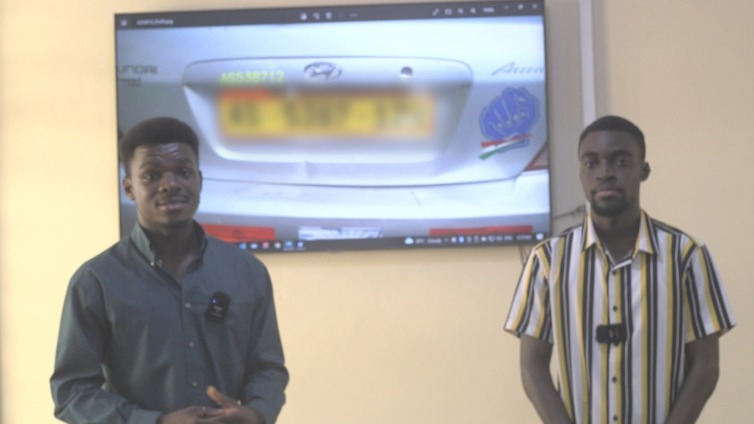
Audio By Carbonatix
Rickety and poorly maintained vehicles on roads across the country remains a major nightmare for commuters.
Despite efforts by the Driver and Vehicle Licensing Authority (DVLA), the Motor Transport and Traffic Department (MTTD) of the Ghana Police Service and other stakeholders to curb the situation, the roads are still full of these vehicles, which cause fatalities.
Fortunately, some computer science students of the Kwame Nkrumah University of Science and Technology, Theophilus Botchway and Markin Papa Kofi Korbah are using Number Plate Recognition to determine the road worthiness or otherwise of your vehicle.
Automatic Number Plate Recognition (NPR) has become part of our lives and promises to stay in future.
The system uses advanced computer vision technologies and artificial intelligence algorithms to identify vehicle licenses.
The system achieves approximately 98.22% accuracy on number plate detection and 78% accuracy on number plate recognition.
The project utilizes image processing technology in order to extract and recognize license plate information from an image or video frames.
Based on the extracted texts from the license plate, they are able to fetch information from the database to determine whether your vehicle is roadworthy.
The system is also tested with different condition complexities, such as rainy background, darkness and dimness, and different hues and saturation of images.
How it works
The first step of NPR is image collection. Images may be extracted from a video, collections of images and cameras. Usually, in the research area, image collections are provided from an open dataset.
The second step is detecting the license plate in the images. This phase usually takes place in the object detection step. Edge detection is commonly used for plate detection. In addition to edge detection, many algorithms have been proposed to solve plate detection.
After the plate is detected, the segmentation phase is conducted to divide the region into locations for detecting digits and letters. The last step is recognition of each segmented region into digits and letters to read the license plate.
To learn more about the App and join the waitlist for its release, partners, stakeholders, or investors can visit https://csapps.knust.edu.gh.
Latest Stories
-
Willie Colón, trombonist who pioneered salsa music, dies aged 75
13 minutes -
Guardiola tells team to chill with cocktails as Man City pile pressure on Arsenal
48 minutes -
Majority blasts Minority over Burkinabe border bloodbath claims
2 hours -
Analyst says Burkina Faso killings were a calculated signal to Ghana
3 hours -
Veep extends Ramadan greetings, donates to Cape Coast Central Mosque
4 hours -
UBIDS secures $6.6m prefabricated classroom complex to end space deficit
5 hours -
Gold Fields Ghana Foundation deepens childhood cancer awareness drive; invests $4.8m in community health
5 hours -
Iran students stage first large anti-government protests since deadly crackdown
5 hours -
Fire guts Saboba Hospital’s Children Ward
7 hours -
Interior Ministry extends aptitude test dates for WASSCE applicants in 2025/26 security services recruitment
7 hours -
National Investment Bank donates GH₵1m to support GAF barracks redevelopment project
8 hours -
Gomoa-East demolition: 14 suspects remanded by Kasoa Ofaakor Court
9 hours -
Divers recover bodies of seven Chinese tourists from bottom of Lake Baikal
10 hours -
From windstorm to resilience: How Wa school is growing climate protection
10 hours -
Reclaiming the Garden City: Dr. Kwame Adinkrah urges Kumasi to rein in billboard proliferation
11 hours

